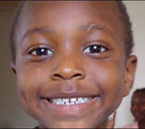
Sudanese refugees in Sydney joyously welcomed the peace agreement signed between the Khartoum government and the southern rebels with up to 1,500 people attending a peace celebration at Parramatta Park last weekend.
The agreement which ends nearly two decades of war was signed in Nairobi, Kenya on January 9.
The war between the Islamic government in Khartoum and the mainly Christian south, has left 1.9 million dead and over 4 million refugees.
Last year there was over 10,000 Sudanese refugees in Australia, with a large Sudanese Christian community in Sydney.
Mayom Tulba, who organised the peace event and is the Sudanese support worker with Anglicare, said the Sudanese community in Sydney is "very happy but still doubts the Sudanese government's intentions'.
Refugee, Nathan Kuku, who has been in Australia for just over two years agreed, "I welcome it with all my heart, but am not optimistic considering this is the second peace deal."
Indeed, the celebrations remain tinged with some trepidation. The Sudanese Government has been known to break such peace promises in the past. A key part of the treaty is a referendum for southern independence which will go forward in six years. Until the referendum occurs, the Sudanese community in Sydney will wait with baited breath.
Mr Tulba said a vote for southern Sudanese independence in the referendum was very important for Christians.
"That will give us the opportunity to have freedom of worship without persecution," he said.
In the meantime a number of Anglican parishes are active in helping Sudanese refugees adjust to life in Australia.
St Stephen's, Belrose, in association with TEAR, are providing interest-free loans for families to come to Australia as refugees and then offering practical support and friendship when the families arrive.
St Paul's, Castle Hill, have team of up to 15 people who teach English as a Second Language (ESL) and take Bible studies throughout the week.
Jan Hayes, who teaches an ESL class, says that, "upon arriving in Australia from war-torn Sudan the refugees experience such a culture shock. Not speaking English as well makes it hard to be employed."
Cheryl Webster, who works for Anglicare assisting new and emerging migrant communities such as the Sudanese, says that culture shock can be very debilitating for the refugees, some of whom come from rural, tribal backgrounds. Some find the Australian way of life extraordinarily disorientating and alien.
However, the Sudanese refugees are trying to put their best foot forward and make a new life here in Australia.
Ms Webster says that mentoring and friendship programs remain the most effective strategies of helping refugees overcoming such culture shock.
"The hope is to link individual Australian families with the refugee families," she said. "The refugees just need help with the simple things " explaining to them simple things such as how to use a washing machine or buy things from a supermarket."
Ms Webster said this is a fantastic and practical way for individual Sydney Anglicans to support the refugees.
Joy as Sydney’s Sudanese party for peace
Stay in the loop, effortlessly.
Subscribe now to get our top stories in your inbox every week.























